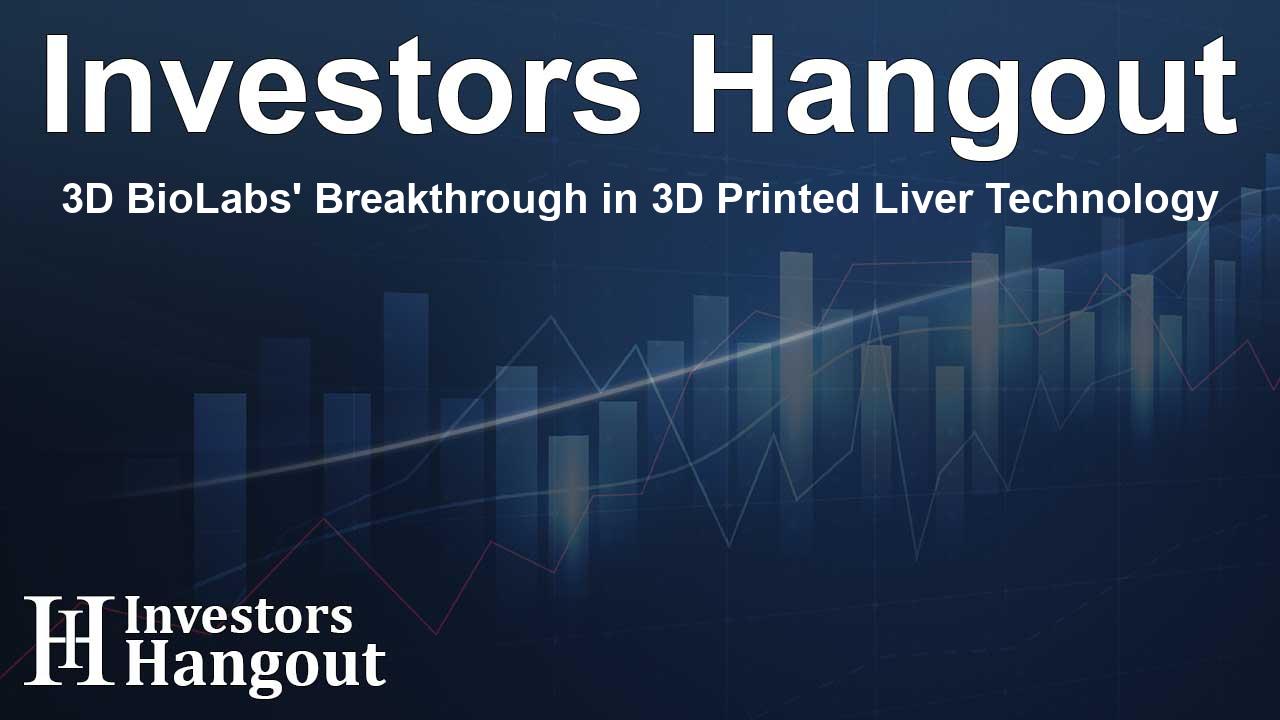3D BioLabs' Breakthrough in 3D Printed Liver Technology

3D BioLabs Reaches Milestone in Regenerative Medicine
3D BioLabs LLC, a leader in the field of regenerative medicine, has achieved a significant milestone in developing 3D printed organs. Their innovative work, recently highlighted in renowned scientific journals, presents an exciting new approach to addressing the urgent organ transplant shortage. Through the integration of 3D printing technology and computational fluid dynamics, the company has demonstrated a viable method for creating large organs that can meet medical needs. This advancement has the potential to revolutionize how organ replacements are approached in the medical field.
Innovative Approach to Organ Creation
The team at 3D BioLabs has created a 3D printed liver device designed to closely mimic natural liver tissue. This impressive technology utilizes fractal architecture, which is pivotal in supporting vascular anastomosis and hepatocyte function. The embedded portal-venous (PV) channels ensure that blood flow continues uninterrupted once implanted, while hepatobiliary (HB) channels maintain the viability of liver cells. By actively perfusing tissue scaffolds, the device enhances oxygen and nutrient availability, promoting higher cell density. This breakthrough is a critical step towards creating a functional liver tissue substitute that could transform transplant medicine.
Scientific Leadership Guiding the Way
Dr. Joseph P. Vacanti, the Scientific Founder of 3D BioLabs and a prominent figure in surgical research, leads this ambitious project. His pioneering work in tissue engineering dates back to 1988, and this recent study marks a considerable step forward in the quest to establish engineered organs that serve as realistic alternatives to transplant surgery. Dr. Vacanti expressed his enthusiasm about the progress being made, stating, 'We are extremely pleased to reach this pivotal milestone in the development of functioning 3D printed organs. We are one step closer to addressing the critical organ shortages faced by patients in need.'
The Journey of 3D BioLabs
The story of 3D BioLabs is rooted in years of dedication and groundbreaking research. It all began with the first patent in tissue engineering granted to Dr. Vacanti, leading to innovations like the Vacanti ear mouse in 1997. This long-standing commitment to science has propelled the company forward, and recent experiments involving the implantation of large, complex devices into pigs demonstrated the viability of its technology. These successful trials further affirm the potential for 3D printed organs to become a reality.
Addressing Global Health Challenges
3D BioLabs stands at the forefront of a transformative movement aimed at improving global health. The company comprises a diverse team of scientists, engineers, and medical visionaries dedicated to crafting artificial organs that can alleviate the plight of individuals suffering from organ failures and significant tissue damage. Their mission is to develop a comprehensive platform technology capable of creating sophisticated organ designs that mimic human anatomy more closely than ever before.
The Future of Organ Transplantation
As the world grapples with increasing organ shortages, 3D BioLabs is poised to make a considerable impact. Their innovative 3D printing methods and insights into organ functionalities hold the promise for producing organs on demand. This development may ultimately ease the burden on transplant waiting lists and provide new hope for patients in desperate need of organ transplants.
Frequently Asked Questions
What recent milestone did 3D BioLabs achieve?
3D BioLabs reached a significant milestone in developing a 3D printed liver implant, showcasing advanced techniques in tissue engineering.
Who is leading the scientific research at 3D BioLabs?
Dr. Joseph P. Vacanti, the Scientific Founder of 3D BioLabs and a renowned expert in regenerative medicine, is leading the research efforts.
How does the 3D printed liver device function?
The device mimics native liver tissue by integrating fractal architecture that supports blood flow and liver cell viability, improving oxygen and nutrient delivery.
What is 3D BioLabs' mission?
3D BioLabs aims to develop man-made organs to combat organ failure and tissue loss, providing new health solutions for those in need.
What implications does this technology have for transplant medicine?
This technology has the potential to address the increasing organ transplant shortages, offering engineered alternatives that could save lives.
About The Author
Contact Evelyn Baker privately here. Or send an email with ATTN: Evelyn Baker as the subject to contact@investorshangout.com.
About Investors Hangout
Investors Hangout is a leading online stock forum for financial discussion and learning, offering a wide range of free tools and resources. It draws in traders of all levels, who exchange market knowledge, investigate trading tactics, and keep an eye on industry developments in real time. Featuring financial articles, stock message boards, quotes, charts, company profiles, and live news updates. Through cooperative learning and a wealth of informational resources, it helps users from novices creating their first portfolios to experts honing their techniques. Join Investors Hangout today: https://investorshangout.com/
The content of this article is based on factual, publicly available information and does not represent legal, financial, or investment advice. Investors Hangout does not offer financial advice, and the author is not a licensed financial advisor. Consult a qualified advisor before making any financial or investment decisions based on this article. This article should not be considered advice to purchase, sell, or hold any securities or other investments. If any of the material provided here is inaccurate, please contact us for corrections.
